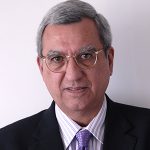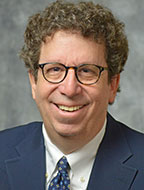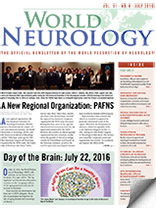The following are statements from the two candidates for the position of elected trustee of the World Federation of Neurology, to be voted on at the upcoming Council of Delegates meeting Sept. 12, 2016, in Prague, Czech Republic.

SAROSH M. KATRAK, MD, DM, FRCPE
Sarosh M. Katrak, MD, DM, FRCPE
Services to the WFN
The Indian Academy of Neurology nominated me as an elected World Federation of Neurology (WFN) trustee, and I am honored to be considered as one of the candidates for this post. My association with the WFN dates back to July 2005 when I became the convener of the continuing medical education (CME) Continuum Education Program for India and brought my country to the forefront of this program. It is because of my involvement and success with this education program that I was made a member of the Education Committee in 2006 and remain a member to this date. As co-chair of the Standards and Evaluation Committee from 2009 to 2013, in association with Professor Aksel Siva (chair), I helped formulate the criteria for evaluation of symposia and CMEs. Once individuals meet stringent criteria, they are accredited and can bear the WFN logo. Currently, I am the chair of the Teaching Course Committee, and I am organizing the teaching courses for the XXIII World Congress of Neurology in Kyoto, Japan, in 2017. I am also an ex-officio member of the Standing Committee.
Background and Achievements
I joined the staff of department of neurology, Grant Medical College and Sir J.J. Group of Hospitals, Mumbai, India, in May 1973, which is affiliated with Bombay University. Sir J.J. Group of Hospitals, a state government-run hospital, caters to the indigent population and brings patients from all over India. This was also the beginning of my teaching experience in neurology, which has continued to this day even after 43 years. I became the head of the department in February 1992 and retired in July 2002. In recognition of my services, the Government of Maharashtra appointed me as professor emeritus in September 2005. Currently, I am director of the department of neurology at the Jaslok Hospital & Research Centre, a private trust hospital which is actively involved with the National Board of Examination in education at the general and super specialty levels.
I was appointed a member of the World Health Organization-WFN International Advisory Group for the Revision of ICD 10, Diseases of the Nervous System in the area of Infections of the Nervous System in January 2010 and was honored by the WFN by being selected to deliver the Masland Lecture at the XXI World Congress of Neurology, in Vienna, Austria in 2013.
Goals
My goal as a WFN trustee is in tandem with the mission of the WFN: “to foster quality neurology and brain health worldwide.” In order to achieve this goal, one has to emphasize on quality neurology education, particularly in underdeveloped nations. Being from a developing country, I have firsthand experience in this field. I hope to achieve this goal with teaching programs, which require minimum resources but will help further neurological education worldwide. I am aware of the financial challenges facing the WFN and underdeveloped countries, and also the hurdles that these pose to achieve these aims. This only can be achieved by being a part of a team, and I firmly believe in the TEAM spirit – “Together Everyone Achieves More.”

STEVEN L. LEWIS, MD
Steven L. Lewis, MD
It would be a tremendous privilege to be elected as trustee by the delegates of the World Federation of Neurology (WFN). As current co-opted WFN trustee, chair of the WFN Education Committee, and editor of World Neurology, I am indebted to this organization, and I would be thrilled to continue to serve the WFN and its many constituents as an elected trustee.
My initial involvement with the WFN occurred coincident with my appointment by the American Academy of Neurology (AAN) as editor-in-chief of Continuum. This joint program of the AAN and the WFN provides print and online access to Continuum to 46 neurological societies whose user groups include participants who would otherwise be unable to access this resource. Supported by a donation from the AAN and its publisher, Wolters Kluwer, Continuum has served as an important educational tool for neurologists in training and in practice worldwide.
Three years ago, I was appointed chair of the WFN Education Committee, which allows me to delve further into the many global educational efforts of the WFN, including continued growth of the teaching centers and department visit programs, and the awarding of annual traveling fellowships. With the close collaboration of Dr. Wolfgang Grisold, we have begun steps toward the development of a global neurological training curriculum, along with input from the members of the Education Committee.
As a WFN co-opted trustee for two years, I have had the opportunity to be even more highly integrated into this organization, working closely with esteemed mentors, including Dr. Raad Shakir, president; Dr. William Carroll, first vice president; Dr. Grisold, secretary general; Dr. Richard Stark, treasurer, and elected trustees Drs. Riadh Gouider, Amadou Gallo Diop, and Morris Freedman. Their knowledge, expertise, and collegiality have been invaluable in my personal development and improving my effectiveness to this organization. More recently, as editor of World Neurology, I have had the unique opportunity to help report on news about neurology and neurologists worldwide.
In my roles and experiences with the WFN, I have met many smart and talented neurologists worldwide. I’ve been impressed by the similarities among all neurologists, while also keenly aware of the differences in available resources and access to care. To achieve its mission, the WFN should continue to partner with the World Health Organization and national and international neurologic organizations; develop more regional teaching centers for neurologic training (now including Rabat, Cairo, Mexico, and Dakar) and department visit programs (currently in place in Austria, Germany, Turkey, and Norway for African trainees, and Canada for Central and South American trainees); increase awareness of travel stipends and research grants; and, among other initiatives, continue to react quickly to novel global neurological issues, exemplified by the swift involvement by the WFN as a clearinghouse for global expertise on the Zika epidemic.
I would be honored to become an elected trustee of the WFN and to continue to faithfully serve our delegates and member neurologists for the mutual goal of improved neurological access and the highest quality of neurology and neurological health worldwide.
